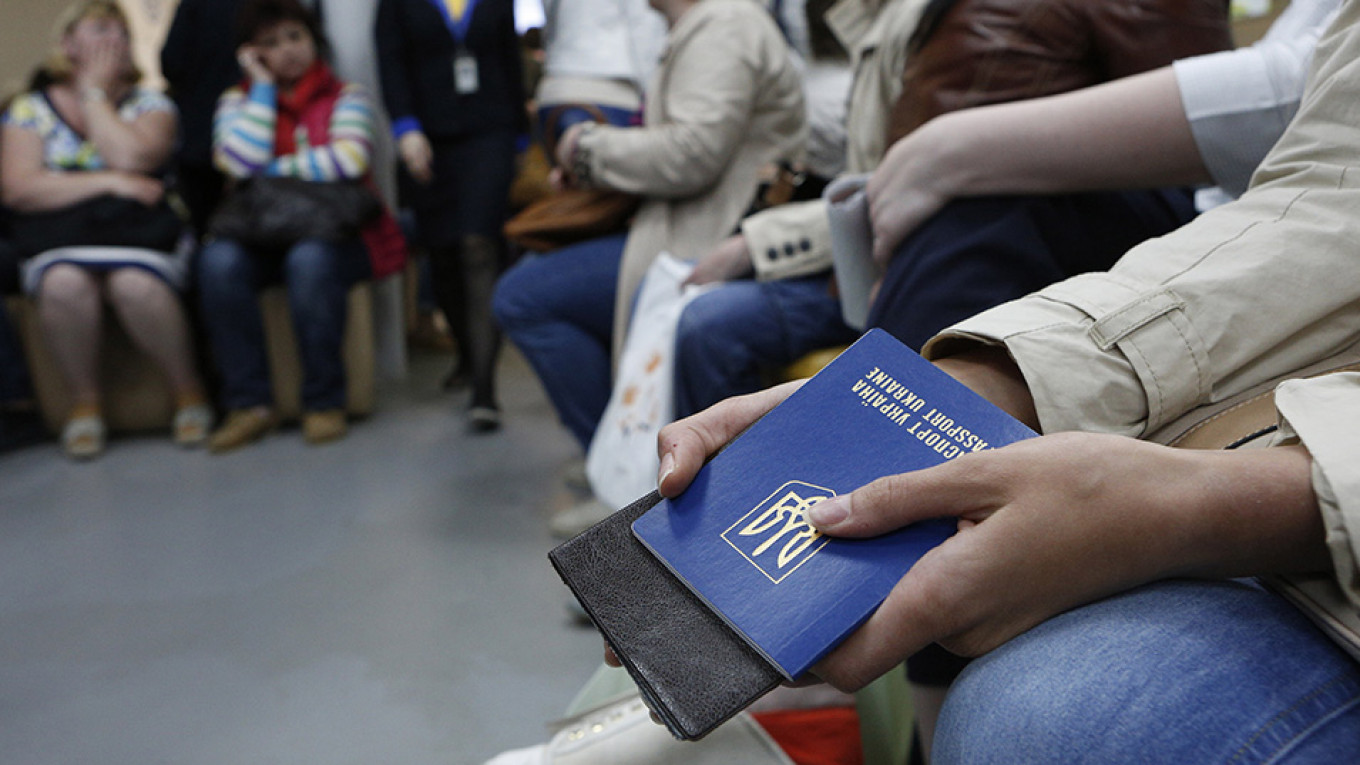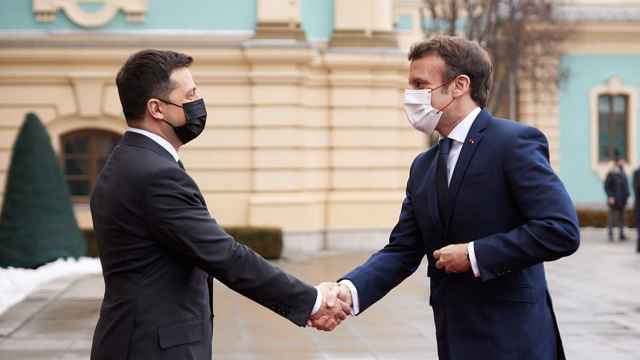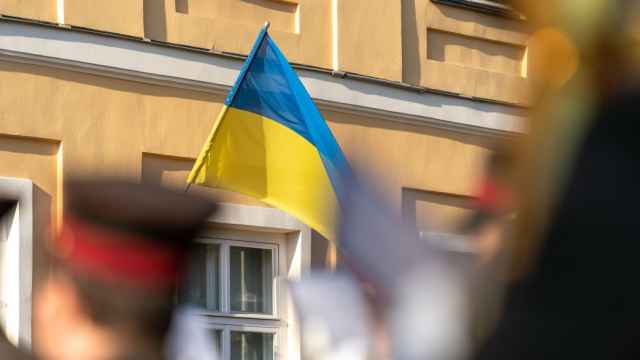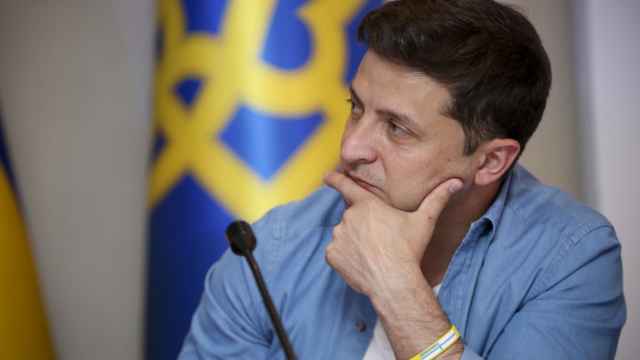Ukraine’s new president, Volodymyr Zelenskiy, is making it clear that he won’t be a pushover for Russian President Vladimir Putin. He posted a biting diatribe over the weekend in response to Putin’s offer of Russian passports to Ukrainian citizens both inside and outside the areas of eastern Ukraine controlled by Russian-backed militants.
Zelenskiy, however, will have to contend with more than one foreign state issuing its passports to Ukrainians as a result of his predecessor’s divisive language and citizenship policy. It should be one of his first things to fix once he’s inaugurated next month.
Putin’s decision last week to offer Russian citizenship to the population of the self-declared Donetsk and Luhansk “people’s republics” run by Kremlin-directed separatist governments, has been widely discussed as an ominous sign.
The de facto annexation of South Ossetia and Abkhazia from Georgia also started with Russian passports being handed out to locals. Russia first made them citizens, then moved in to “protect” them, then recognized the breakaway regions they populated.
Putin may well have a similar plan for Ukraine, despite the Russian authorities’ claims of adherence to the Minsk agreements of 2014 and 2015, which envisage the return of eastern Ukraine to the Kiev government. That passports have been offered during Ukraine’s presidential transition, that is, at a moment of uncertainty, lends weight to the plausibility of such a scenario.
Putin, however, isn’t limiting his mischief-making to eastern Ukraine. He told a press conference in Beijing on Saturday that he was “thinking” about simplifying Russian citizenship applications for all Ukrainians. That means Russia is getting into a game already played by two European governments unhappy with Ukraine’s nationalistic language laws.
In 2017, Ukraine passed a law that would have banned teaching in languages other than Ukrainian beyond the primary school level. It angered the Hungarian, Romanian and Polish governments because there are significant minorities in Ukraine that speak these countries’ languages as mother tongues. Though the government agreed to amend the law, the anger didn’t subside.
Hungarian Prime Minister Viktor Orban has long demanded autonomy, dual citizenship and language freedom for the more than 150,000 Hungarians who lived in Ukrainian Transcarpathia, once part of the Austro-Hungarian Empire, at the time of the 2001 census (Ukraine hasn’t held one since).
When it became clear that President Petro Poroshenko wasn’t going to allow dual citizenship and was bent on making the Ukrainian language dominant throughout the country, Hungary began quietly issuing passports to Hungarian-speaking Ukrainians. Last October, Ukraine expelled a Hungarian consul for the practice.
Romania, which has issued at least half a million passports in neighboring Moldova, ostensibly to make things up to the descendants of Bessarabians deprived of Romanian nationality by Soviet occupation in 1940, has been worried about the hundreds of thousands of Ukrainian citizens who speak Romanian or practically identical Moldovan. Applications for Romanian citizenship have increased since 2017, when the country scrapped consular fees for applicants.
Russians are Ukraine’s biggest ethnic minority and the one whose language presents the biggest obstacle to the dominance of Ukrainian. Most people in Ukraine speak Russian, and many speak it better than the nation’s sole official language.
That Russian was the Soviet Union’s lingua franca is not the only explanation: Russia is a bigger market for books, popular music and other cultural products, and Russian social networks such as Vkontakte and Odnoklassniki have remained popular in Ukraine even though they were banned under Poroshenko (now, Ukrainians use virtual private networks to access them).
We know perfectly well what a Russian passport represents.
Days after Zelenskiy defeated Poroshenko in a runoff election on April 21, the Ukrainian parliament passed a new language bill Poroshenko had backed. It decrees the exclusive use of Ukrainian, not just by officials but by all service personnel such as waiters and shop assistants, and requires that all media use Ukrainian as their primary language.
That would be a major shift in a country where top news media have always used Russian first. Officials and military personnel can be fined for not speaking Ukrainian in official contexts.
Though there’s nothing wrong with promoting a country’s national language as part of its cultural identity, Ukrainian citizens who speak other languages better than the official one can’t but feel pressured by the new rules. That’s where Putin comes in with his offer of Russian passports.
Zelenskiy, who himself speaks Russian better than Ukrainian and tends to switch to his mother tongue when he has something important to say, didn’t, however, take kindly to Putin’s offer. In a bilingual Facebook post, he advised Putin against “wasting time trying to seduce Ukrainian citizens with Russian passports.” He wrote:
We know perfectly well what a Russian passport represents. The right to be arrested for peaceful protest. The right not to have free and competitive elections. The right to forget about the existence of natural human rights and freedoms. Don’t count on many Ukrainians to want to become the human oil into which the Russian authorities are trying to transform their own people.
This doesn’t augur well for a Moscow-Kiev reset after the election of a Russian-speaking president. But Zelenskiy is probably right. Not many Ukrainians are likely to apply for Russian passports. The Henley Passport Index ranks the Russian travel document 47th in the world; it provides visa-free access to 118 countries.
The Ukrainian one is ranked 40th, with access to 128 countries. A Hungarian passport is better, at No. 10 — its holders can travel visa-free to 180 countries and they can work anywhere in the European Union.
A Russian passport is only useful if one plans to live, work or study in Russia — or if, say, a Ukrainian retiree on a meager pension wants access to more generous (albeit far from lavish) Russian social benefits. But according to the Russian national pension fund, even the residents of the “people’s republics” of eastern Ukraine who receive Russian citizenship will only get access to pensions if they move to Russia.
To ensure broad uptake in Ukraine, Putin probably would need to offer citizens some of the freedoms Zelenskiy mentioned and access to more visa-free countries. That’s not in the cards.
Yet Zelenskiy, too, has a problem. Ukraine is a country with a declining population, and making ethnic minorities and Russian-speaking Ukrainians of all ethnicities feel unwelcome with tough language and citizenship laws isn’t going to improve things. Zelenskiy has argued for luring the residents of eastern Ukraine back into the fold. The new language bill is definitely not helping.
The president-elect has signaled a willingness to reexamine the bill, but his ability to change it depends on the results of the October parliamentary election or his willingness to go directly to the people to set softer norms.
In his Facebook post, Zelenskiy vowed to offer Ukrainian citizenship “to representatives of all nations suffering from authoritarian and corrupt regimes, above all to Russians who may be suffering more than anyone else today.” That’s a bold statement not matched by current practice. In any case, Ukraine doesn’t have enough to offer its citizens yet to make its passport more desirable than the Russian one.
Both countries have a lot of work to do to make their citizenship attractive. Today, I’d bet on Ukraine to do a better job, but that depends in large part on whether Zelenskiy acts smarter and with more integrity than his predecessors.
This article was originally published in Bloomberg Content.
A Message from The Moscow Times:
Dear readers,
We are facing unprecedented challenges. Russia's Prosecutor General's Office has designated The Moscow Times as an "undesirable" organization, criminalizing our work and putting our staff at risk of prosecution. This follows our earlier unjust labeling as a "foreign agent."
These actions are direct attempts to silence independent journalism in Russia. The authorities claim our work "discredits the decisions of the Russian leadership." We see things differently: we strive to provide accurate, unbiased reporting on Russia.
We, the journalists of The Moscow Times, refuse to be silenced. But to continue our work, we need your help.
Your support, no matter how small, makes a world of difference. If you can, please support us monthly starting from just $2. It's quick to set up, and every contribution makes a significant impact.
By supporting The Moscow Times, you're defending open, independent journalism in the face of repression. Thank you for standing with us.
Remind me later.








